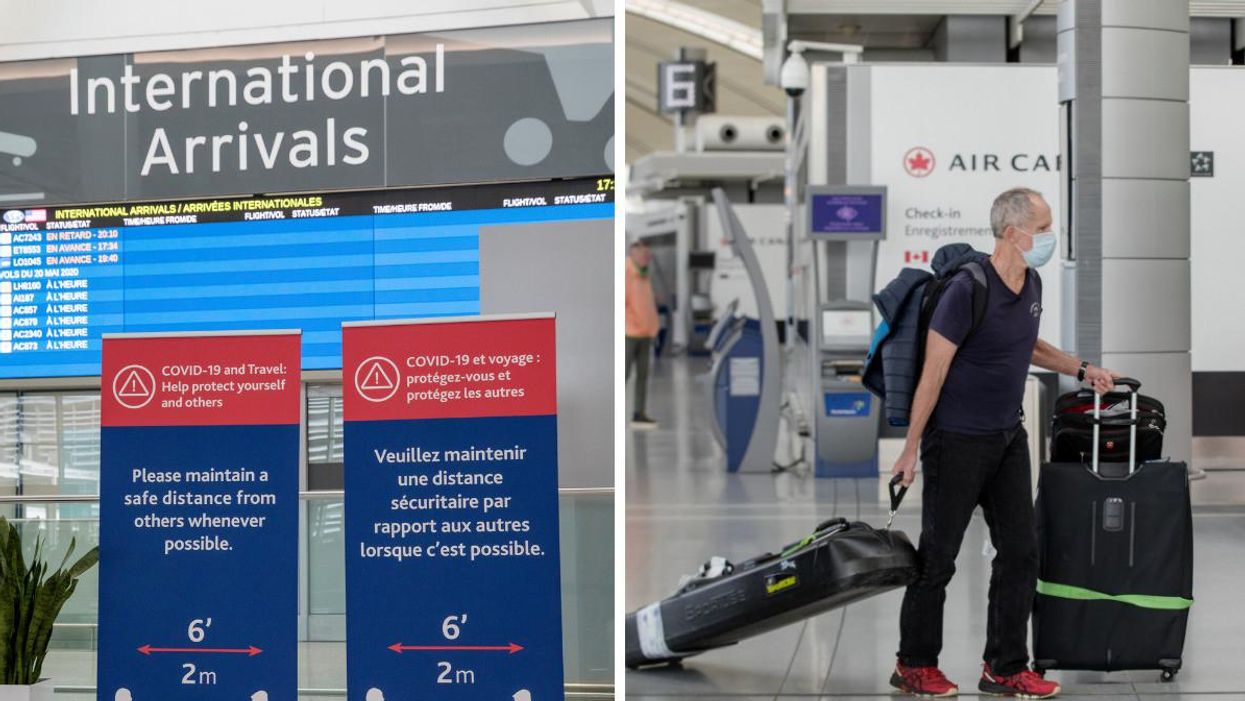Canada's Travel Rules Are Changing Once Again & Here's What You Need To Know
More restrictions are lifting on April 25.

Toronto Pearson's international arrivals with a sign about COVID-19. Right: Traveller at the airport.
New changes to Canada's travel rules are coming into effect and here's everything that you need to know about the updates.
On April 22, 2022, the federal government announced that it's making multiple changes to border measures including ones for fully vaccinated travellers and unvaccinated children.
Effective at 12:01 a.m. ET on Monday, April 25, 2022, unvaccinated or partially vaccinated children aged 5 to 11 who are accompanied by a fully vaccinated parent, step-parent, guardian or tutor won't be required to complete a pre-entry COVID-19 test to enter Canada.
However, pre-entry tests will still be required for partially vaccinated or unvaccinated travellers 12 years of age and older who are eligible to travel to Canada.
Also as of April 25, all fully vaccinated travellers won't need to provide a quarantine plan upon entry anymore.
That requirement will also be removed for travellers with a medical contraindication to a COVID-19 vaccine and children aged 5 to 11 years old who are accompanied by a fully vaccinated parent, step-parent, guardian or tutor.
Fully vaccinated travellers arriving in Canada on or after April 25 will no longer be required by the federal government to wear a mask in public spaces for 14 days after their arrival.
Also, fully vaccinated travellers won't have to monitor and report if they develop signs or symptoms, quarantine if another traveller in the same travel group has symptoms or tests positive or maintain a list of close contacts and locations visited.
The federal government is reminding travellers that everyone entering the country is still required to use ArriveCAN to submit mandatory travel information within 72 hours of their arrival in Canada and before boarding a plane or cruise ship destined for Canada.
If they don't submit their information to ArriveCAN, travellers won't be eligible for the fully vaccinated traveller exemption, which means they could have to show a pre-entry test, provide a quarantine plan, quarantine and test.
They could also face delays upon arrival for public health questioning and even be "subject to fines or other enforcement action."
The federal government also said that all travellers must wear a mask throughout their travel journey no matter what their vaccination status is.
Back in March, Dr. Theresa Tam said federal policies about mandatory masking on planes and vaccine passports for travel are part of a "precautionary" and "thoughtful" line of action.
The country's top doctor also noted that government officials are "looking at a phased approach of removing" policies like the mask and vaccination rules.
- Canada's Mask Rules Are Not Changing For Travellers Despite ... ›
- The US Is Extending The Canada-US Border Vaccination Requirement For Canadian Travellers - Narcity ›
- Travel Restrictions Are Changing At The Canada-US Border & Here's Everything You Should Know - Narcity ›
- Canada's Travel Restrictions Have Changed & Now It's Easier To Travel With Unvaccinated Kids - Narcity ›
- Pearson Airport Wants Travellers To Know These Things After The Latest Travel Changes - Narcity ›
- Trudeau Says 'All Of Us Want To Be Done' With Restrictions But There Needs To Be Balance - Narcity ›
- 7 Places Canadian Tourists Can't Travel To Right Now Even If They're Fully Vaccinated - Narcity ›